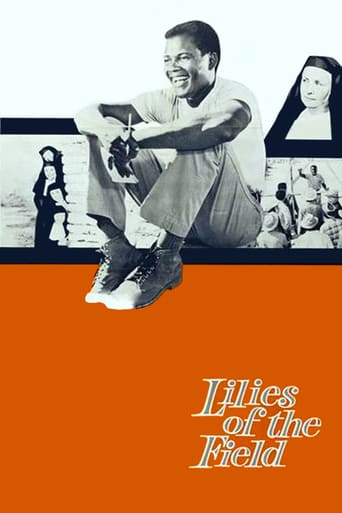

Movies are amazing in the fact that they can offer such a wide range of stories. At least they once did. Complicated political thrillers to horror films to slapstick comedy, all can be found on film. One thing that makes for some joyous moments though it when you take an incredibly simple story and fashion it into a memorable movie. Such is the case with this film.Sidney Poitier stars as Homer Smith, a handyman who stops by a remote farm when his car overheats while he's heading west. Run by a group of Eastern European nuns they are glad to oblige once they get past their language differences. Noticing he's equipped with tools to use, their head Mother Maria Marthe asks him if he could help by fixing their roof. He does so and then spends the night, expecting to be paid the next morning.That doesn't happen when it turns out the nuns have no money to offer. Relying on what they grow and a few items like milk and eggs they get directly from the source, they can't afford anything. Mother Maria puts him off for the time being and convinces him to help with a few more items, staying in return for dinner.Payment doesn't arrive the following day as Mother Maria insists that Smith was sent to them by divine intervention in with the intent of helping them build the church they've been working on for some time now. He argues the point, still insisting as delicately as possible that he needs paid. A battle of wills follows in civil fashion between the two.On Sunday morning he goes with the nuns to a nearby eatery where their weekly services are held from the back of a truck with a priest there to provide for the flock. Going into the restaurant he talks to the owner and learns about the hardships the nuns went through to escape and get to this country. By the time they head back he agrees to at least help them clear the foundation area for the chapel.All of this back and forth carries on throughout the film. It's easy to guess up front if the church will be built or not by the end credits. What makes the story interesting is the fleshing out of the characters and the things that happen on the way there. Smith getting to know the nuns and helping them learn English, his teaching them the gospel tune he grew up with "Amen" which they sing with relish and his growing fondness for them all.The movie is a feel good film with plenty of humor to have you laughing and enough emotional stirrings to play at your heart. There is no political undertones on display here, just the story of a group of people coming together to unite for something good. It's rare to see that these days and nice to be able to experience it here again.Some might not think that being a black and white film it would benefit from a blu-ray release but it does offering the cleanest presentation I've seen of the film. What else could we expect from Twilight Time? Extras include an isolated score track with some effects, a commentary track with film historians Lem Dobbs, Julie Kirgo and Nick Redman and the theatrical trailer. Once again Twilight Time limits their releases to just 3,000 copies so if interested pick up yours today.
... View MoreHomer Smith (Poitier) is driving along a hot desert highway when he realizes that he needs water for his car radiator. He pulls up to a remote convent of German-speaking Catholic nuns. Poor, unsuspecting Homer thinks he'll just get the water and be on his way. But it soon becomes apparent that he's going to be roped into doing work for the Lord.Despite the movie's religious theme, this is not an hour-plus long sermon. This is a charming, humorous, wonderful movie. As usual, Poitier embodies his character with naturalness and ease. Though Homer tries his best to stay independent, arguing and threatening to leave the Catholic group on any number of occasions, he's also charmed by the innocent, and at times childlike, sisters. I loved watching Homer scrap with the hard-nosed Mother Superior in particular, whom he sarcastically calls "Mama". They are both stubborn people, for different reasons. She orders him to go to Mass ("I'm a BAPTIST!", he responds, but he goes!), and her declaration that he will be building their chapel sends him into a hilarious temper tantrum. But the viewer already knows he's in for it Still, we don't anticipate the wonderful events that unfold around the building of it, and the insights we get into Homer Smith's character.I love the scene where the nuns ask Homer to play the guitar. He picks it up and strums, "Frankie and Johnny were looo-verrs " The nuns sit looking at him silently, blankly. Homer quickly stops himself, looking as if he were wishing there were a hole he could crawl into.If one were especially philosophical, he or she could see this film and think of a higher theme, where there are times when each of gets into life situations where we fight and feel helpless, but in the end it was all "meant to be", for a higher purpose. But even without trying to get any deeper meaning out of it, Lilies of the Field is just a funny film with well-drawn characters that's worth a watch.
... View MoreA traveling handyman (Sidney Poitier) becomes the answer to the prayers of nuns who wish to build a chapel in the desert.The general idea of this film, a traveling handyman who helps nuns build a church despite not being Catholic, is alright. Not great, but alright. What really elevates it is the casting of Sidney Poitier. He could read a phone book and it would be an amazing performance. So although this is not his best-known film, it is still remembered today because of his presence.A sequel, "Christmas Lilies of the Field", was made in 1979 for television in which Homer Smith (now played by Billy Dee Williams), returns and is "convinced" to build a kindergarten for a group of orphans and runaways whom the sisters have taken in. Now, I don't know anything about this and suspect it is terrible. But Williams has been an under-appreciated actor, so maybe I should seek it out.
... View MoreWhen I first watched this film years ago I was moved by it, by the growing solidarity of an isolated desert community, bereft of everything but their faith, and some members without even that to rely on. Now that I'm more, well, experienced -- I'm trying to avoid the word debauched -- it's a little more difficult to warm my heart but not yet impossible.Poitier is a happy-go-lucky handyman who bumps into half a dozen German nuns in the Sonoran desert. They more or less force him to begin building them a chapel, so that the Catholic circuit rider doesn't have to say mass from the back of his trailer. There are all sorts of travails. Obstacles must be overcome. There is neither enough labor nor materials. Does the entire Hispanic community show up to provide the missing labor? Does the local construction company provide the bricks and mortar as a result of a sort of desert-parched Pascal's choice? Does Poitier build the nuns their chapel? Are you kidding? Now, having seen it for the second time, it's still uplifting, and somewhat comic as well, with occasional dramatic elements. Lilia Skala, as the mother superior, has the truly thankless role of the authoritarian who believes that if you trust in God you needn't worry about anything else, but she delivers. You might not think so when you see her in action because the character is so stern and lacking in humor. Poitier is to Skala as fire hydrant is to dog. But it takes skill to play such an unpleasant role.And this must be ranked among Sidney Poitier's better performances. (He won an Oscar for it but that means nothing.) Poitier's forte was similar to Gregory Peck's. He could project sincerity and moral fury almost flawlessly. But this role gives him a chance to lighten up. There's hardly a moment when he's on screen that you can take your eyes from him. He invests the smallest moments with something unique. Nobody else could have done it quite the same way. And there are some keenly observed moments: Poitier and the men have finished the chapel and are playing music, dancing, and getting drunk, while the nuns and the wives sit on benches and glare at them. Women don't like seeing men have a good time and getting drunk with other men. I enjoyed watching it again.Having said that, I'm forced to admit that a second viewing, after years of marination in movie conventions, means hauling one's aesthetic sensibilities stark naked through some exceedingly prickly beavertail patches.Are you familiar with the scene in which some worldly outsider teaches a couple of uptight nuns how to sing a raucous spiritual con mucho gusto? Clapping their hands and swaying from side to side? No? How about the scene in which somebody teaches some non-English speakers how to speak English -- in a REGIONAL DIALECT? As in, "Sit yo' self down, y'all?" Would you believe an Irishman who drinks too much? An Irish priest? There were times when I winced, when I turned my face aside, as I tend to do when a large animal is slaughtered on screen.Yet, for all that, it's still an uplifting and, in its own limited way, a satisfying fable. Have the kids watch it too. The more innocent among us will get more out of it.
... View More